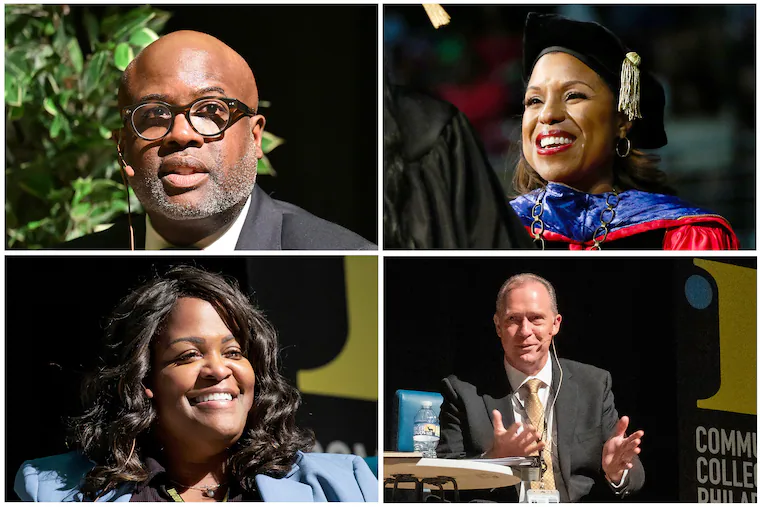Copyright The Philadelphia Inquirer

The Community College of Philadelphia’s Board of Trustees is preparing to select a new president, possibly as soon as Tuesday morning. A special meeting has been scheduled for 8 a.m. on Zoom “to approve an offer of employment to a presidential candidate,” according to the board’s website. Their selection follows daylong interview sessions with the four finalists, who came to campus earlier this month and met with faculty, staff, students, and board members. » READ MORE: Community College of Philadelphia announces four finalists for president, including its current interim leader “Each comes with their strengths and weaknesses,” said Sandra Gonzalez-Torres, CCP’s director of articulation and transfer, who attended meetings to hear all four candidates. “At this time, the college really needs strong leadership that will guide us to a strong future. The college needs strong fundraising and ways to support our students in retention and graduation.” Two have limited presidential experience, including one currently serving as interim CCP president. Three are candidates of color. One candidate has extensive fundraising experience, while another is a native Philadelphian who once worked at the college and has a background in counseling. Candidates addressed the college’s low morale and said they had the skills to help it heal following the forced departure of former president Donald Guy Generals after 11 years in the job. Here’s a look at the four candidates: » READ MORE: CCP board appoints provost as interim leader after ousting president Lisa Cooper Wilkins touted more than 25 years of higher education experience, from faculty member to dean to her current position as vice chancellor of student affairs at City College of San Francisco — where she has worked since 2020. “I consider myself to be a very collaborative leader and one that leans into communication as one of the primary strategies to work effectively across constituencies,” said Cooper Wilkins, a first-generation college student who grew up in a single-parent home. » READ MORE: Ousted CCP president alleges in court complaint that board chair pressured him ‘to direct CCP business to political allies and vendors’ Cooper Wilkins, who previously worked at San Joaquin Delta College and the University of the Pacific, cited her background in counseling as a plus. She described herself as a “very calming presence,” which could be helpful in leading CCP out of a tumultuous time. She is the only candidate who is a native of the Philadelphia region, having attended the Philadelphia High School for Girls and later CCP. Cooper Wilkins also served as a dean at CCP from 2008-10, during which time she said she made a point of visiting the regional centers. She said she would continue to devote time to them if she became president. “I’ve worked at institutions where unfortunately more often than not they feel like an afterthought,” she said. She also was assistant director and senior counselor for student support services at Drexel University in the mid-1990s. » READ MORE: CCP settles contract dispute with former president Cooper Wilkins acknowledged her fundraising experience has been “limited,” but that she had some experience during her time at CCP. She received her bachelor’s degree from Goucher College, master’s degrees from Marymount College and Villanova University, and her doctoral degree in higher education administration from George Washington University. Alycia Marshall, who has been serving as interim president since Generals’ departure, leaned heavily on her experience in the role and how she stepped in to keep the college running smoothly just weeks before commencement. “Having someone who is understanding about the particular state that the institution is in, who sees where the opportunities are, who is supportive and about ensuring a culture of inclusivity, of collaboration … would be a critical piece" for the next president, she said during an interview session. Marshall, who was the college’s provost and vice president for academic and student success for nearly three years before becoming interim president, said she would lead both internally and externally, focusing on faculty and staff satisfaction as well as building relationships with funders and donors. She said she has already met more than 20 City Council members and state legislators. She acknowledged that an employee satisfaction survey that she commissioned when she became interim president showed low morale and promised to address it. “Things that would be a priority to me (are) insuring transparency and frequent communication,” she said. A native of Maryland, Marshall started her career as an adjunct professor at Anne Arundel Community College in Maryland, near Annapolis, and later became a full tenured professor and chair of the mathematics department. She was promoted to associate vice president at the Maryland community college, where she spent 23 years and founded the African American Leadership Institute. Marshall said over the last six months she learned to be comfortable not knowing what will happen next. After a board meeting earlier this month, a board consultant who is the liaison to the presidential search committee said on a still-active microphone that Marshall had not been well-received on campus. Marshall said at the interview session that she did not agree with that and that she has developed relationships with people across the college. “If you have worked directly with me, you will know I am here for the students and I am here to support faculty and staff,” she said. Marshall received her bachelor’s in mathematics from the University of Maryland, Baltimore County, her master’s in teaching from Bowie State University, and her doctorate in mathematics education from the University of Maryland. Jesse Pisors most recently served as president of the 10,000-student Pasco-Hernando State College, a community college in the Tampa Bay area, but resigned after less than 18 months on the job. His resignation came after Florida Gov. Ron DeSantis’ Department of Government Efficiency found that the college was doing poorly in student retention and the board accused Pisors of hiding information, according to news reports. “The political situation in Florida had devolved to a point where I felt I would not be able to continue to be effective as president,” Pisors told the audience at one campus meeting. He acknowledged about a half percentage point drop in retention. “That is exactly why one of our top 10 priorities in the strategic plan ... had improving retention,” he said. “We were working on that.” But he said he’s still proud of his time there, noting the creation of a strategic plan and an increase of more than 8% in full-time equivalent enrollment. Citing the need for CCP to bring in more money at a time when public funding is tight, Pisors touted his experience in fundraising and marketing, noting his previous positions as a vice president at Texas A&M University-San Antonio and the University of Houston. He also had served as executive director of development and alumni relations at the University of Pittsburgh. While he was the lone white candidate, he noted he served as a principal of a school in Mexico previously, is fluent in Spanish, and is married to a native of Mexico. Pisors has 27 years of educational leadership experience, from kindergarten through the college level, which he said gives him “wide exposure” and broad “understanding.” “Community colleges kind of live in the middle,” said Pisors, who got his bachelor’s in history from Oral Roberts University, a master’s from Oral Roberts, and his doctoral degree in higher education administration from Texas Tech University. “They reach back into high school. They reach forward into universities.” Jermaine Wright, who is vice president for student affairs at City University of New York-Herbert H. Lehman College, said he was drawn to CCP by its mission and its students whom have a similar background to his. He said he’s a first-generation college student and an immigrant who became a naturalized citizen. His father worked as a porter and his mother and grandmother cleaned office buildings. “I am CCP,” said Wright, who has worked at Lehman for five years and previously held administrative positions at Southern Connecticut State University and City University of New York. “CCP is me.” He cited his experience in workforce development and work in programs that help underrepresented students succeed. Asked to describe his vision for the college, he cited increasing enrollment, finding different funding streams, insuring academic excellence, and creating a more inclusive campus environment. But he cautioned that any new vision would have to be developed with faculty and staff in order to get full support. He also cited past experience in fundraising and said success can be achieved by knowing where people are and meeting them there. “We need to have constant face time,” he said. Wright said he wouldn’t mind if members of the board of trustees showed up at the college a lot. “That means they care just as much as I do,” he said. Once an adjunct lecturer at Rutgers-Newark, Wright got his bachelor’s degree from Binghamton University, a master’s from CUNY, and his doctoral degree in public administration from Rutgers-Newark.



